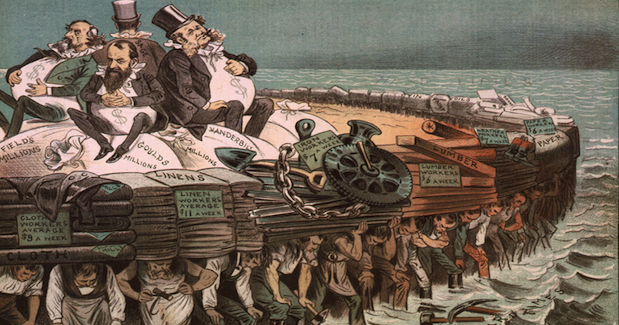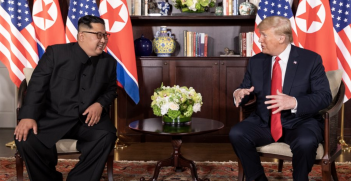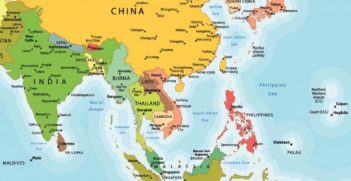The US Election and the Second Gilded Age

Over the past 30 years a perfect storm has formed to produce a US election in which a large proportion of the American public are backing ideas that have heretofore been unthinkable. It’s a situation that is being echoed in many other countries. The only analogy for this phenomenon is the Gilded Age (1870-1900) when similar rapid changes in technology, media and demographics converged to wreak similar damage on US politics.
I’d like to offer some thoughts about the election that will hopefully endure past 8 November. I’d like to talk about the defining feature of this election and the domestic and the global forces that have produced it. Some of them are unique to the US, but many of them are manifest in all Western democracies.
The defining feature of this election is that it has been a populist uprising against every candidate for president, but one, who has any record of the traditional qualifications for president.
Let me start on the Democrat side. You had a popular governor, Martin O’Malley. He did not receive a single delegate in the Democratic primary. You had a former secretary of the Navy and a very popular senator, Jim Webb, and you also had a very successful and popular governor and senator, Lincoln Chafee—both of whom never lasted long enough to find out whether they could win a single delegate.
The most experienced, the best supported, the best funded candidate – a former secretary of state, US senator and the first lady of both the United States and the State of Arkansas, was challenged all the way to the Convention by a senator whose brand was being an outsider and who had had few legislative victories during his time in the senate.
On the Republican side you saw the same thing. Seventeen people ran in the republican primary. Nine, including Jeb Bush and Chris Christie, had been two-term governors with national name recognition. All of them were easily vanquished.
Five more of the candidates were current or former senators. Only one of them lasted and that was Ted Cruz and that was only because he was well known to be a true outsider and the way people knew that was that his calling card was that most of the senate hated him and members of the senate gleefully confirmed that.
So, the person ultimately selected by the Republican Party is a man who has never held any public office nor even run for any other public office. He’s had no military or other public service in his career and has expressed disdain for people who have.
So the fact that the Republican Party chose Donald Trump as its nominee for president reflects the fact that a lot of Republicans do not trust anyone—Democrat or Republican—who is associated with government as their president.
The fact that Secretary Hillary Clinton lost several states to a previously unheralded senator from Vermont reveals that this isn’t a one party issue.
So the question is ‘Why?’ And what are the consequences for Western democracies around the world?
Recently we witnessed the stunning decision in the UK where the people of the United Kingdom rejected the recommendation of their prime minister and virtually all leaders across the political spectrum and voted to exit the EU.
We’ve witnessed the people of Colombia reject the recommendation of their elected leader to end a 50-year war with the FARC and effectively vote in favour of continued fighting.
We’ve witnessed the Philippines elect a leader who attacks all ‘politics as usual’, belittles allies and alliances, and has authorised the vigilante killings of thousands of people.
And even here in Australia, which is relatively sedate by contrast, Pauline Hanson’s One Nation Party won four seats in the last election. You’ve had five prime ministers in the past seven years –if you count Kevin Rudd twice.
So, these are ‘interesting times’—not only in the US.
What I’d like to focus on is, ‘What is different this time?’ because many things are actually very much the same. More than half of Donald Trump’s supporters are relatively affluent Republicans who support him simply because he’s not a Democrat and he won’t do the things that Democrats have promised to do—principally, raise taxes for the top 1 per cent of wage earners. But they would have voted for any of the Republican candidates.
What is animating those who made him the Republican nominee and helped him defeat all those other traditional Republican candidates?
I believe there are five substantial trends that drive them. Most of these trends are global and they have consequences for all of us.
These are the five:
- the fallout from the global financial crisis;
- demographic change in our workforce;
- the runaway pace of technology;
- the corrosion of traditional media; and
- wage stagnation and the concentration of wealth.
These are the five extraordinary trends converging all at the same time. Over the past 30 years a perfect storm has formed to produce an election in which a large enough proportion of the American public have backed ideas that have heretofore been unthinkable. Their candidate has encouraged foreign nations to hack his opponents internet. He’s encouraged nations to obtain nuclear weapons. He’s proposed abandoning allies. He’s demanded that one of the US’ largest trade partners pay for a wall to keep its own citizens away. And he’s called for banning people from entering the country based solely on their religion.
The only analogy to this phenomenon was during the Gilded Age when a similar rapid change in technology, in media and in demographics all converged and had similar effects on our politics.
We think this is an extraordinary time that has never happened before, but think 100 years ago, when you had a similar revolution in technology, media, global integration and demographics all occurring at the same time.
In the year 1879, in a 3-month period, both the electric light and the internal combustion engine were invented. Just like the integrated circuits that have powered this whole information age and digital world, those two inventions over 40 years produced the telephone, the phonograph, motion pictures, cars, airplanes, elevators, x-rays, electric appliances, consumer appliances, highways, suburbs, supermarkets. All of these were phenomenon created in a 40-year period.
And it caused politics to go haywire. There were massive disruptions in labour markets, unprecedented levels of migration, and other effects of industrialisation. The effects may sound very similar to what’s going on today: popular unrest—especially in Europe and in East Asia—xenophobia, isolationism, violent protests and the emergence of authoritarians and demagogues around the world.
In the US, William Jennings Bryan was nominated three times for president during this second industrial revolution and Gilded Age. He offered a bizarre mix of populist messages: he was anti-Darwinism, he was pro-isolationism, he proposed a silver standard and he favoured prohibition of alcohol. He stunned the political establishment with the way that he campaigned, defying all of the conventional logic.
Demagogues flourish when large sections of society feel overwhelmed and fear that they have been left behind. They offer simple solutions to complex problems and they play on people’s fears and their prejudices. And that’s where we stand today.
I take great comfort in Winston Churchill’s observation that America always does the right thing—after exhausting every other possibility.
We made some decisions during that period—from the 1880s to 1920—that we would later regret, but overall we preserved the fundamentals of what in fact has made America great. We remained a nation that ensured religious tolerance, the rule of law, free press, free minds, and free movement of capital. We became a fairer nation, a more prosperous nation and a more secure nation; not by abandoning our values, but by preserving them.
Nations around the world face the challenges that I have described for America. The future is here; it’s just not evenly distributed, yet. The impulse to divide and exclude, to isolate, to create barriers, to resist the future, and to follow false prophets is strong during times like these. And that’s why it’s precisely at these moments that diplomacy—the art of understanding, of giving order and sense to disorder, of finding common ground and of bringing people and nations together—has never been more necessary.
Jeffrey Bleich is a former US Ambassador to Australia (2009-2013) and special counsel to the White House under President Obama. He is now a partner with global law firm, Dentons.
This is an extract from the 2016 Sir James Plimsoll lecture delivered by Jeffrey Bleich at the University of Tasmania on 24 October. The annual Sir James Plimsoll lecture series is supported by the AIIA Tasmania Branch, the Department of Foreign Affairs and Trade and the University of Tasmania.
A full transcript of the speech is available here and it can be watched here.





